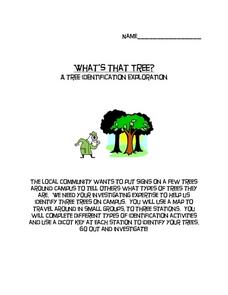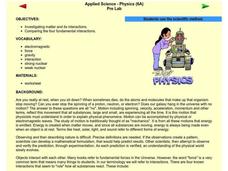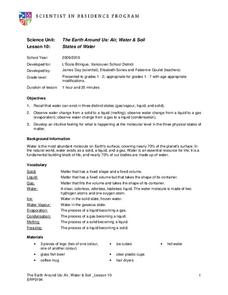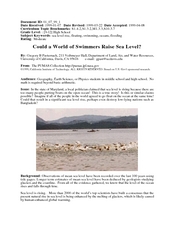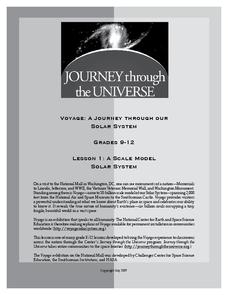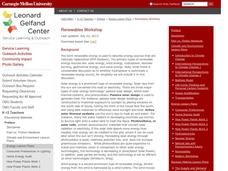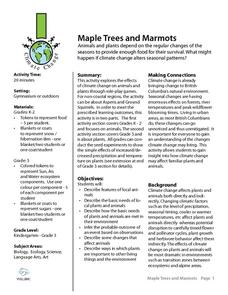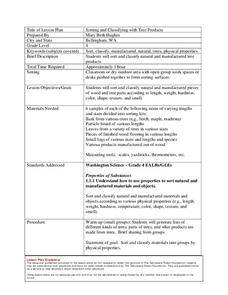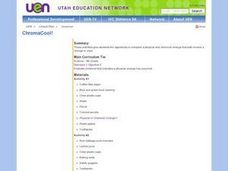Curated OER
Survival of the Fastest: Predator and Prey in the African Savannah
Students explore the predator-prey relationship using an interactive game. In this biology lesson, students compare their physical attributes. They explain how predators develop to make it stronger and efficient as hunters. Each...
Curated OER
What's That Tree?
Fifth graders identify trees along a nature trail. Using a dichotomous key, 5th graders answer questions to aid in their identification of trees along a specified nature trail. Observations are recorded in their science journals. Sample...
Curated OER
Matter and Energy
Students explore energy by completing a science worksheet in class. In this principles of matter lesson, students define the vocabulary terms force, gravity, nuclear, and electromagnetic before reading assigned text about energy....
Curated OER
States of Water
Young scholars investigate the 3 states of matter. In this physical science "matter" lesson, students observe and participate in a number of demonstrations involving melting and freezing water. Young scholars observe the effect heat has...
Curated OER
Waves
Young scholars identify the different parts of a wave. In this physics lesson, students explain how animals communicate using sound waves. They discuss the effect of Navy's sonar on dolphins and whales.
Curated OER
The Theory of Evolution
In this theory of evolution worksheet, students review vocabulary words associated with evolution including the different types of evolution patters. This worksheet has 5 true or false and 5 matching questions.
Curated OER
Could a World of Swimmers Raise Sea Level?
Students determine the volume of water they displace. In this earth science lesson, students calculate the total water displaced by the world's population. They evaluate whether or not this value is enough to raise the sea level...
Curated OER
What's Up at the Rim?
Students are sent on a scavenger hunt to find as many plants as they can in nature.
Curated OER
HABITAT for the other 90%
Learners examine the connection between the habitat needs of endemic species to the habitat needs of humans. In this habitat instructional activity young scholars research the habitat requirements of a given family then develop an...
National Nanotechnology Infrastructure Network
Powers of Ten with the Blue Morpho Butterfly
Explore the powers of ten while examining a Blue Morpho butterfly wing. Learners discover there is a lot more than meets the eye when one looks close enough.
University of Colorado
The Jovian Basketball Hoop
Can you listen to Jupiter on a simple radio? Turns out the answer is yes! The resource instructs scholars to build a simple radio to pick up the radio waves created when the charged particles from the sun hit Jupiter's magnetic...
Lerner Publishing
Living or Nonliving
It's alive! Or is it? Through a series of shared readings, whole class activities, and independent exercises children explore the difference between living and non-living things, creating a pair of printable books...
Wild BC
Is Climate Change Good for Us?
Is it really that big of a deal if the global climate undergoes a little change? Young environmentalists consider this very question as they discuss in small groups the impact of different climate change scenarios on their lives,...
Journey Through the Universe
A Scale Model Solar System
Between the time scientists discovered Pluto and reclassified it as a dwarf planet, it did not even make one full revolution around the sun. In two activities, scholars investigate scale models and their properties. Pupils find that it...
It's About Time
Refraction of Light
Don't shine like a diamond, refract light like a diamond. Young scientists use an acrylic block and a laser light to observe refraction. Advanced scholars figure the sine of the angles of reflection and incidence as well as mastering...
Carnegie Mellon University
Renewables Workshop
Youngsters examine resource maps to find out which states are using solar and wind power and discuss as a class various other renewable energy sources. They use a provided data table to record pros and cons to each technology, build and...
Prince William Network
Migration Headache
During this game, kids become migratory shorebirds and fly among wintering, nesting, and stopover habitats. If they do not arrive at a suitable habitat on time, they do not survive. Catastrophic events are periodically introduced that...
Curated OER
Water in the Biosphere
Environmental explorers examine the campus and take note of living organisms. Introduce them to the biosphere and the questions of the day: How much water can be found in the biosphere? A slide show helps you along, and even contains a...
Curated OER
The Water Cycle
Your class sets up a mini water cycle model to examine the process. Then they watch an animation, following a water molecule through the cycle. A well-developed lab sheet guides learners through the lesson and a PowerPoint presentation...
Curated OER
Water in Earth's Hydrosphere
Environmentalists test stream water for temperature, pH, and turbidity. Each group shares their information and then the class makes an overall evaluation of the water quality. A slide show sets the backdrop for the teaching portion and...
Wild BC
Maple Trees and Marmots
Kinesthetic activities simulate animal activity as the seasons progress in a lesson that introduces climate change to primary pupils. The kids role-play maple trees collecting what they need to survive, but as each year comes...
Curated OER
Sorting and Classifying with Tree Products
Fourth graders sort and classify wood. In this sorting tree products lesson, 4th graders sort and classify tree parts and pieces of wood, both natural and manufactured according to their properties.
Curated OER
ChromaCool!
Fifth graders watch a video about physical and chemical changes. In groups, they participate in a variety of activities involving color. They write their observations in a journal. To end the lesson, they use a checklist to classify...
Curated OER
Fire Triangle in the Forest
Students investigate the physical properties of fire by creating storyboards. In this elements lesson, students view a video clip of forest fires and identify the cause. Students create large storyboards defining the three...



